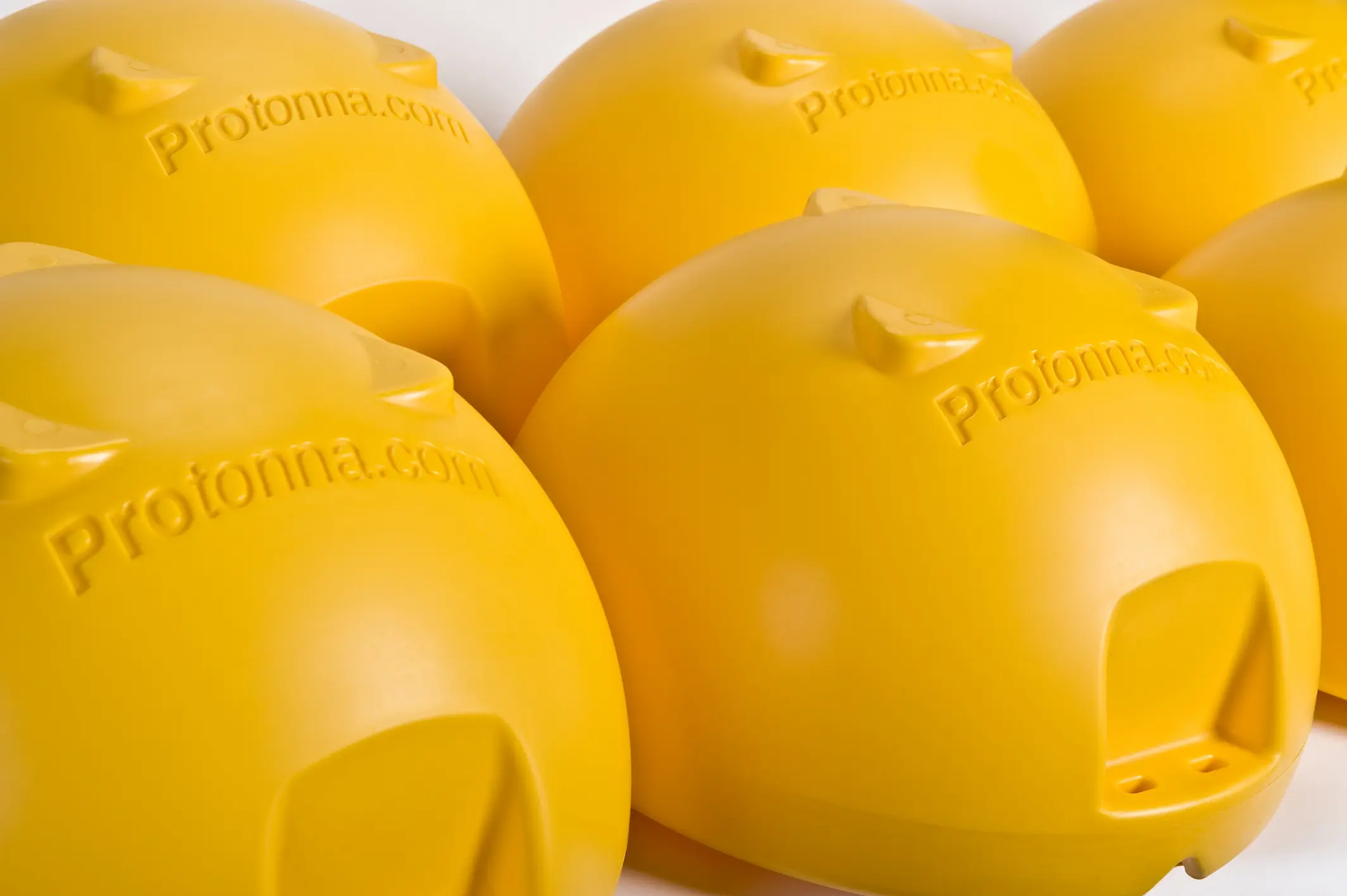Rotational moulding in the offshore market

The offshore industry operates in some of the most challenging and unpredictable environments in the world. Whether it’s drilling rigs, wind farms, oil platforms, or maritime installations, the materials and products used in this sector must be exceptionally durable, strong, and reliable. Pentas offers rotational moulding as a versatile and robust manufacturing technique that perfectly meets the demanding needs of the offshore market.
Table of contents
Applications of rotational moulding in the offshore market
Floatation devices and buoys
Floatation devices and buoys are essential for navigation and safety in offshore operations. Rotationally moulded buoys and floatation devices offer excellent stability and durability, crucial for marking shipping lanes, oil platforms, and other offshore locations. These products withstand harsh sea conditions, including exposure to strong waves and UV radiation.

Storage and transport containers
Rotationally moulded containers are ideal for the safe storage and transport of liquids, chemicals, and other materials frequently used in offshore operations. The smooth interior walls of these containers make them easy to clean and maintain, which is essential for maintaining safety and hygiene. Additionally, these containers can be designed to meet specific offshore requirements, such as high chemical resistance and robustness.
Protective enclosures and fastenings
In the offshore sector, protecting equipment and electronics from the elements is vital. Rotationally moulded protective enclosures and casings offer excellent protection against water, salt, and mechanical damage. These products can be customized to meet specific fastening requirements, providing reliable solutions for securing and protecting components on platforms and vessels.
Stabilization tanks
Wind turbines in offshore environments are constantly exposed to the dynamic forces of wind and waves. These forces cause unwanted vibrations that can affect the stability and efficiency of the wind turbines. This is where slosh damper tanks come into play. These tanks, each with a diameter of more than 2 meters and half-filled with fluid, are placed in the towers of the wind turbines. By stacking dozens of these discs on top of each other, they help to dampen vibrations and ensure the structural integrity of the wind turbines.

Benefits of rotational moulding in the offshore market
Exceptional resistance to corrosion and impact
In the offshore industry, materials are continuously exposed to corrosive environments such as seawater, salty air, and extreme weather conditions. Rotationally moulded products are impervious to corrosion, which is essential for the longevity and reliability of products used in offshore applications. Additionally, these products can withstand heavy mechanical loads and impacts, crucial for use in dynamic environments.
Design freedom and complexity
Rotational moulding offers unparalleled design flexibility, allowing for the creation of complex structures and hollow shapes that are difficult to manufacture with other techniques. This flexibility is especially useful for the production of buoys, pontoons, containers, and protective enclosures, which often require unique and specific designs. The process also enables the seamless integration of functional features such as handles, ribs, and mounting points into the product, eliminating the need for additional assembly and reducing production costs.

Lightweight yet strong
Weight is a critical factor in the offshore industry, where moving and installing heavy equipment can be costly and time-consuming. Rotationally moulded products are significantly lighter than their metal counterparts, without compromising strength and durability. These lightweight properties make them easier to handle, install, and maintain, leading to lower operational costs and improved efficiency.
Environmental friendliness and sustainability
Recycling and reuse
Many rotationally moulded products are fully recyclable, contributing to sustainable practices within the offshore industry. This reduces the environmental impact of projects and supports the transition to a greener future. Furthermore, the rotational moulding process minimizes waste by using only the required amount of material, resulting in more efficient use of resources.
Reduced maintenance costs
Thanks to their exceptional durability and resistance to wear and tear, rotationally moulded products have a longer lifespan, leading to lower replacement and maintenance costs over the product’s life cycle. This is a significant advantage in the offshore industry, where maintenance is often expensive and time-consuming.
Rotational moulding offers numerous benefits for the offshore industry, from durability and strength to design flexibility and environmental friendliness. Whether stabilizing wind turbines, storing hazardous materials, or protecting sensitive equipment, rotational moulding is one of the best methods for manufacturing products suitable for the most demanding conditions.

)